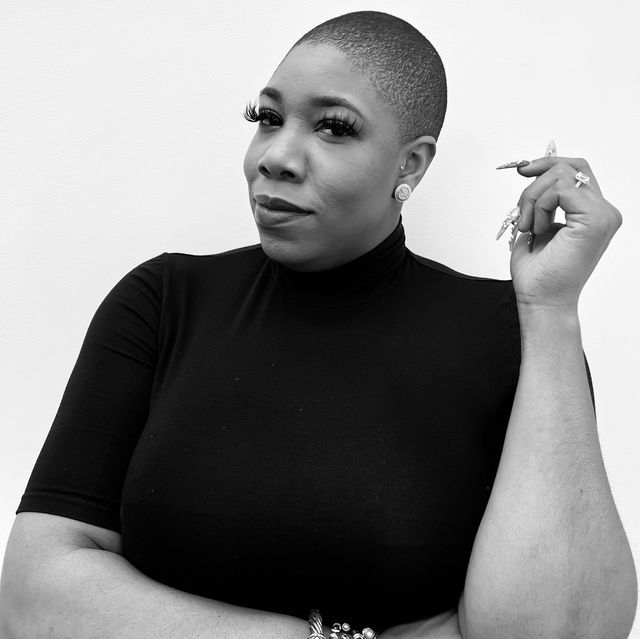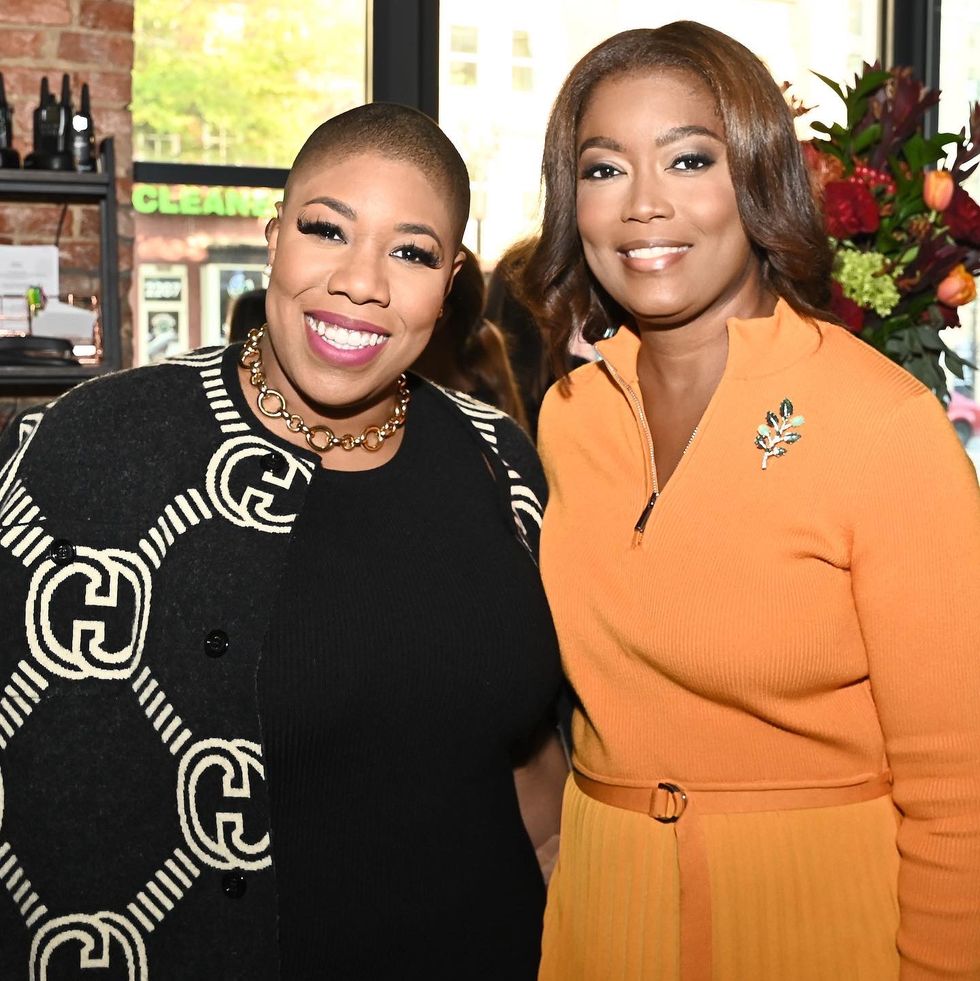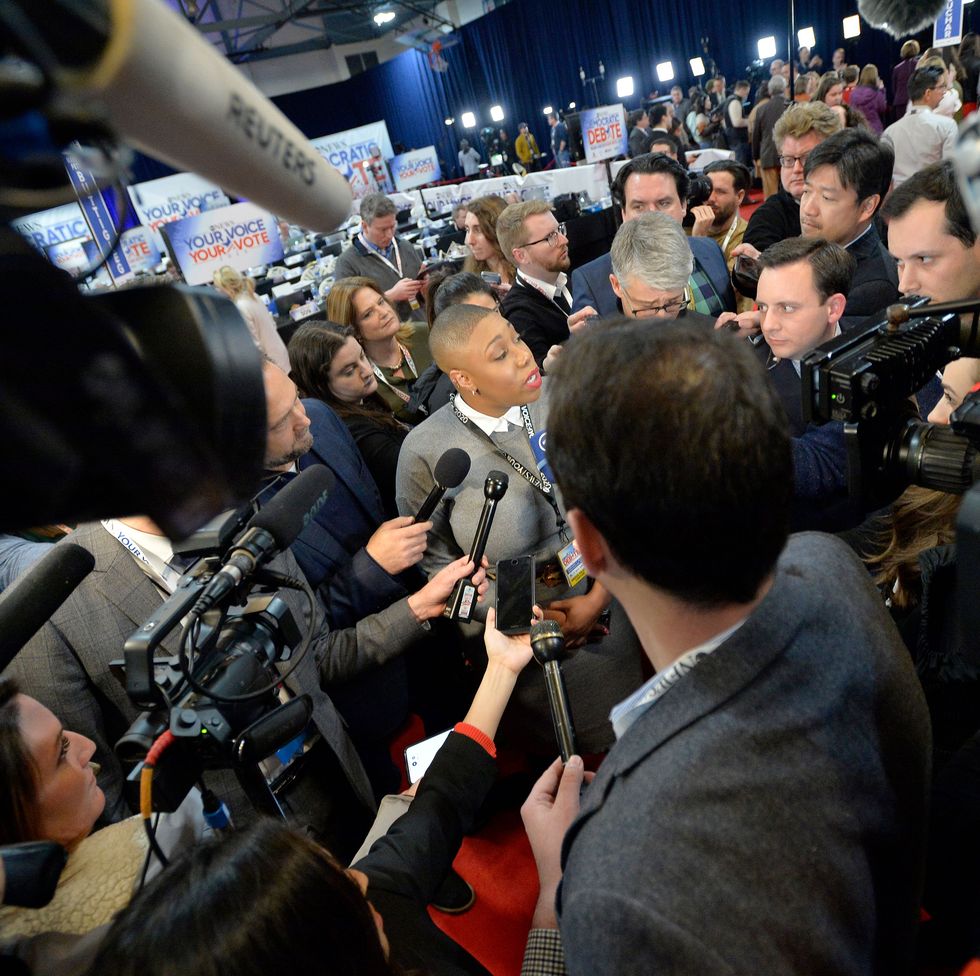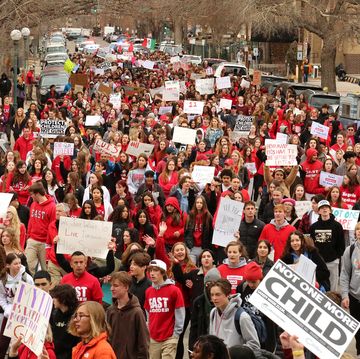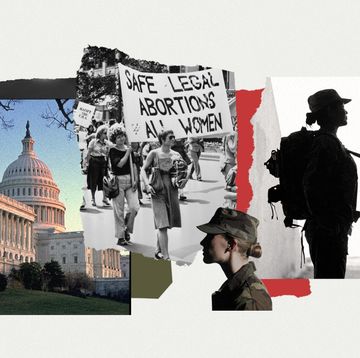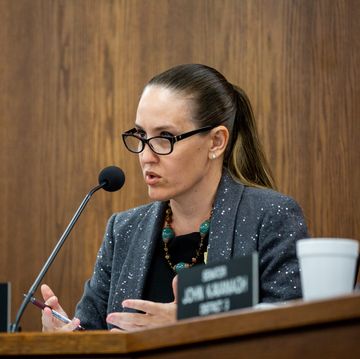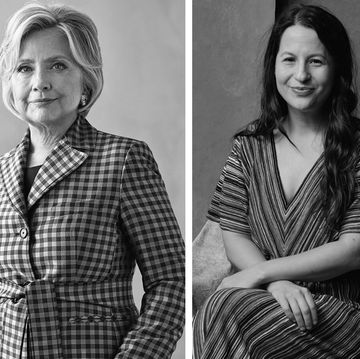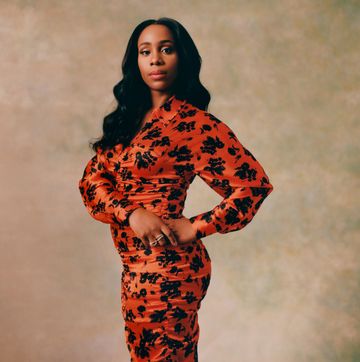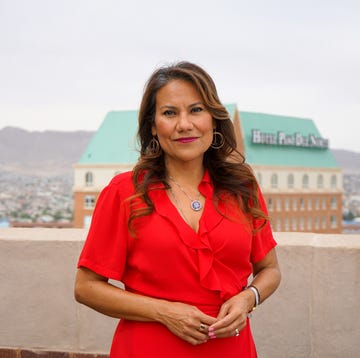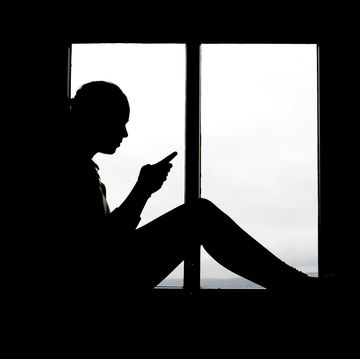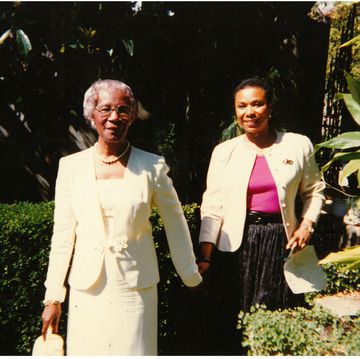This Saturday, Symone Sanders will become the newest anchor on MSNBC, hosting her own namesake show Symone on both the cable network and its hub on Peacock. It might seem like a natural move for the 32-year-old, who left her position as a senior advisor and chief spokesperson for Vice President Kamala Harris at the end of 2021. But when she first started exploring the idea, she was met with disbelief. “I had an executive tell me to my face: ‘No one’s going to give you a show,’” Sanders told ELLE.com over the phone a few days before the Symone premiere. “There were folks that told me they didn’t see me much as a political person….which is very interesting, because I have worked at the highest level of politics. I worked at every level, actually.”
Sanders was 25 when she became the national press secretary for Sen. Bernie Sanders’s 2016 presidential campaign. From there, she was a commentator and analyst at CNN and a senior advisor to Joe Biden during his presidential campaign, before joining the Biden-Harris administration. But now—at least on Saturdays and Sundays at 4 P.M. EST and on-demand on Peacock on Mondays and Tuesdays—she’s the star. “I spent my career being a spokesperson for other people,” she said. “And now it’s just me.” Sanders said she hopes to go deep on her show, discussing politics and culture and providing essential context around the “most pressing issues of today.”
Below, Sanders gives an inside look at the making of Symone, including the lessons she learned from Harris that she still carries with her and why, even in the midst of this career high, she still plans to prioritize self-care.
I was looking back to when we spoke in 2020 for ELLE’s Office Hours series. In that piece, you said your dream job would be to have your own show, and now here we are.
Life comes at you fast, Madison.
Did you always think this would be your next step after working at the White House?
I would like to tell you that I had it all planned out, and my crystal ball was right, and everybody else was still trying to catch up to me and my dreams. But I did not know that this was exactly what I was going to be doing next. Going in, I didn’t know when I was going to leave the White House. I said at the time, and it is still true, that I was tired. Also, I wanted the opportunity to plan my wedding and enjoy being engaged. The third thing I thought about when I was leaving was that I love politics, but I also love the opportunity to talk about the broader cultural trends and give my opinion. I wanted whatever I did next to allow me to engage in the media conversation.
You’ve spoken about how people dismissed the idea of you having your own show or suggested you do other things.
Oh honey, I had an executive tell me to my face: “No one’s going to give you a show.” They said, “Look, as your friend, no one’s going to give you a show.” In my head, I thought, they definitely won’t if I don’t ask. Then, when [MSNBC president] Rashida Jones asked me what I wanted to do next, I told her I wanted a show. Rashida’s response was, “Well, what kind of show would you have?” That was the first time anyone allowed me to detail the vision that was in my brain. There were folks that told me they didn’t see me much as a political person. They saw me as doing something else, which is very interesting, because I have worked at the highest level of politics. I worked at every level, actually. I wonder, would they be saying that to me if my name was Tim, and I was 35 years old? I don’t know.
How did you start to craft the vision for your show?
I’m a recovering communications staffer. In that role, I was often critical of the media apparatus, and I started to think about the things that I have been critical about and what I would do differently. If I’m critical of the fact that I don’t think enough people in the media break things down or spend time to peel back the layers of a story or are as intentional as they could be about the words that they use to describe things, then I have to make sure that, now that I have this opportunity, that is what I’m doing.
I also really took time with the executives at Peacock and MSNBC so that they could get to know me. The show is titled Symone; it’s me bringing my perspective. They can’t help me craft a show if they don’t know who I am. So I had a lot of conversations about who I am, what I believe, my background. I like to describe myself as a bald, curvy Black girl from North Omaha, Nebraska. So I think I’m different than a lot of the other people out there on television.
You’ve also talked about wanting to reach the “non-political group chats” with your show. What’s your strategy for making that a reality?
First, we have to have conversations that people who do not live in Washington, D.C. are having and use the words that they use. I just checked on my scripts for our practice rehearsal today, and in one of the scripts, it said “GOP.” I said, “What does GOP mean?” and everybody looked at me like I was being crazy. I said, “Well, I know what it means, but I want you to know, regular people don’t know what GOP means.” I didn’t know what it meant until six months into living in Washington, D.C. So you need to say “Republicans.” Let’s just say what we’re trying to say. I want to break it down and make it plain and be direct. The second part of that strategy is that we are employing a robust digital strategy. I’m 32 years old; when I wake up in the morning, the first thing I do—don’t tell my new boss—but I don’t turn on the TV. I’m checking Twitter, Instagram, my email, and my text messages. The first time I turn on the news is probably when I get in the car. And I’m plugged in, right? I care about what’s happening. There are so many people like me. Those are your non-political group chat folks.
How about your personal style and the visuals on the show?
My primary color on my show is green. My logo is whimsical, and I’m bringing the fashion. I told the team, “Give me all the standup shots. I can put on a cute shoe.” I’ll never forget at this seminar in D.C., back when I was an intern, they said people in D.C. really only wear three colors to work: black, gray, and dark blue. I was thinking, oh my God, I was about to wear a colorblock jumpsuit to work the next day. Can I not wear my jumpsuit? I wore my jumpsuit! And I will continue to wear my jumpsuits. I’ll rock my bold lip, because it doesn’t just have to look one way.
You once said working for Vice President Harris was the first professional scenario where you saw a woman that looked like you, making history every day, in a position of power. How did that experience affect how you approach your career and how you show up in these spaces?
I’ve learned something from everyone I’ve worked for, and the thing that I learned from Vice President Harris was a dedication to diligence. She is dedicated to making sure she gets it right, and that’s what she expects out of her staff. Also, I had the opportunity to spend a lot of time with her, and I never once saw her let what people have said about her keep her from doing her job. She got up every single day and continued to go to work and make space for other people. That is something I will always take with me. I have a responsibility to keep the bar high and substantive, but also make sure I’m opening up doors for the people that come behind me.
My anchor producer, who also serves as my assistant, is a young Black woman who recently graduated from college. I have a responsibility to make sure that she has a good work experience, that she sees me standing up for myself and the people on my team, that she sees me holding other people accountable, that she sees me stay true to who I am. I want her and all of the other young people, whether they are Black, white, Native American, Asian American, Pacific Islander, or otherwise, to know that you can walk into a space and be yourself and do a damn good job. That it’s okay to stand up for yourself. That it is alright to bring your different perspective into the room—just do your research. I felt that when I worked for the Vice President.
You mentioned that when you decided to leave the White House, you needed a break. How has your relationship to rest and self-care evolved over the years?
I’m very protective of my rest and self-care. I like going to the nail salon, but it’s not just because I like big, fabulous nails; it is my time to decompress. Family is also extremely important to me. I lost my father five years ago. He died unexpectedly, and I dove right back into work. This happened in 2017, and nobody would’ve known that while I was riding the highest of highs—I was a commentator at the time, I was traveling—I was really struggling. I was sad thinking through all of the things I missed with my father, the calls I didn’t return, the texts I didn’t send, the times I decided not to go home. In the aftermath of my father’s passing, I was so regretful. I have his text messages saved to my computer. But I don’t want to have to live through text messages for anybody else that I love. I want to be able to live through the great memories that we’ve had. But I can’t do that if all I do is work. I’m excited about this show and the opportunities before me. But I also care about my family and prioritize my mental health. I feel nothing but pure, unadulterated joy right now, and if I want to continue to live in that space, I have to be intentional about protecting my peace.
This interview has been lightly edited and condensed for clarity.
